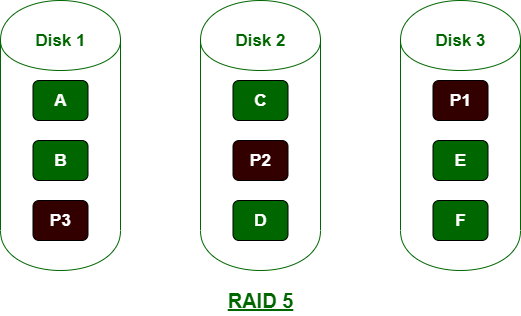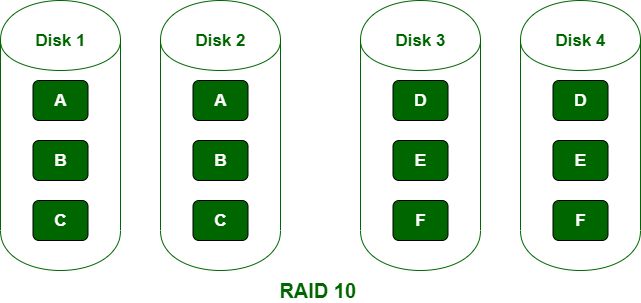1. RAID 5:
在RAID 5中,将数据平均分配到所有磁盘中,所需的最小物理磁盘数为3。RAID5的主要优点是无需镜像空间,在恢复时支持数据访问,并具有很高的数据安全性。 RAID 5通常适合中级应用程序。

2. RAID 10:
RAID 10也称为镜像条带。它是嵌套的RAID级别,因为它结合了两个标准RAID级别的功能:RAID 0和RAID1。RAID 10同时支持镜像和条带化功能,并且可靠性很高。由于使用了更多数量的磁盘,因此成本很高,最少需要的物理磁盘数量是4。

RAID 5和RAID 10之间的区别:
| S.No. | RAID 5 | RAID 10 |
|---|---|---|
| 1. | In RAID 5, data is divided equally in all disks. | In RAID 10, data is stored in one disk and mirrored in another disk for security of data. |
| 2. | It emphasis on data storage. | While RAID 10 emphasis on performance over storage. |
| 3. | It is less reliable than RAID 10. | It is far good in reliability than RAID 5. |
| 4. | In RAID 5, minimum number of physical disks needed is 3. | In RAID 10, minimum number of physical disks needed is 4. |
| 5. | RAID 5 is fast in writing speed as compared to RAID 10. | RAID 10 is slow in writing speed as compared to RAID 5. |
| 6. | It has more storage in comparison to RAID 10. | It has less storage in comparison to RAID 5. |
| 7. | It does not support mirroring and redundancy of data. | It supports mirroring and redundancy of data. |
| 8. | It is more complex as there are drives as well as parity disk. | It is simple than RAID 5 due to absence of parity disk. |
| 9. | It is worthwhile as it consists of less number of disks. | It is expensive as it consists of more number of disks. |